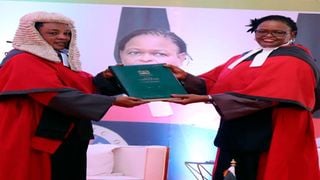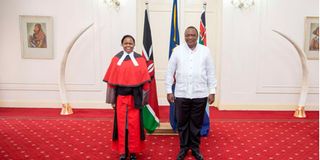
Chief Justice Martha Koome (right) receives instruments of power and the State of the Judiciary Report from Deputy Chief Justice Philomena Mwilu at the Supreme Court buildings in Nairobi during her assumption of office ceremony on May 24, 2021.
| Dennis Onsongo | Nation Media GroupNews
Premium
Uhuru rejects six judges from JSC list, confirms 34 new ones
What you need to know:
- The move by Mr Kenyatta to edit the list is likely to spark a fresh row with JSC and activists, who insist the President’s role in recruitment is confined to confirming the list as forwarded by the commission.
The long-drawn battle between President Kenyatta and the judiciary over the appointment of 41 Court of Appeal judges appears far from over after the Head of State appointed 34 and rejected six on Thursday.
Among those turned down are Justices Joel Ngugi and George Odunga who sat on the High Court bench that last month declared the push to amend the Constitution through the Building Bridges Initiative (BBI) unconstitutional.
Others are High Court judges Weldon Korir and Aggrey Muchelule, Chief Magistrate Makori Evans Kiago and High Court Registrar Judith Omange Cheruiyot.
Another nominee, Justice Harrison Okeche, died in a road crash last year as the then Chief Justice David Maraga pushed Mr Kenyatta to appoint the nominees vetted and cleared by the Judicial Service Commission (JSC).
The judges who were appointed Thursday are long-serving Justice Msagha Mbogholi and his High Court colleagues Hellen Omondi, Francis Tuiyott, Jessie Lesiit, Mumbi Ngugi and Pauline Nyamweya. Also appointed is law scholar Kibaya Laibuta. Mr Kenyatta also appointed nine judges to the Environment and Land Court and 18 judges to the Employment and Labour Relations Court.
Some judges destined for the two courts were also left out.
The move by Mr Kenyatta to edit the list is likely to spark a fresh row with JSC and activists, who insist the President’s role in recruitment is confined to confirming the list as forwarded by the commission.
JSC completed the judges’ recruitment in August 2019 and forwarded the list to the President for appointment.
Integrity issues
The list included 11 judges destined for the Court of Appeal, 20 judges to the Environment and Land Court and 10 to the Employment and Labour Relations Court. Several petitions were filed in a bid to compel the Head of State to appoint the judges.
Among the petitioners were Mr Adrian Kamotho and Mr Okiya Omtatah, who argued that the President’s failure to appoint the judges was a conspiracy to sabotage and frustrate the Judiciary in executing its constitutional mandate.
While rejecting the list in 2019, the President, through Head of Public Service Joseph Kinyua, said some of the nominees had integrity issues. He told the court that the President had received adverse reports on some of the persons listed for appointment as judges after their names were published in the media.
He said it would be irresponsible and contrary to his oath of office for the President to appoint judges or any other public or state officer when serious questions have been raised about their integrity. He went on to say the allegations were more serious for judges who enjoy security of tenure and whose probity and integrity should be above reproach.

President Uhuru Kenyatta with newly sworn-in Chief Justice Martha Koome at State House in Nairobi on May 21, 2021.
NIS concerns
Chief Registrar Anne Amadi admitted receiving a letter from the National Intelligence Service (NIS), raising concerns about the suitability of some of the persons shortlisted for interviews.
She, however, said the NIS did not give details of the concerns and, therefore, the JSC could not act on the letter without specifics, which would have enabled those adversely mentioned to respond.
She faulted President Kenyatta, saying he has several representatives in the JSC, including Attorney-General Kihara Kariuki, Olive Mugenda, Felix Kosgei and a nominee of the Public Service Commission who took part in the interviews.
She said the JSC is an independent commission that is guided by the Constitution and the law, and not subject to direction or control of any person or authority. Mr Maraga tried in vain to have the President appoint the judges.
“The Constitution, as the two multi-judge court cases held, requires you to appoint judges recommended to you by the JSC, which you have refused to do,” Maraga said in a press conference.
“The laws of this country include valid court orders. It therefore behoves you to appoint the 41 persons recommended for appointment by the JSC as ordered by the court without any further delay.”
Maraga’s view
Mr Maraga argued that, if the executive’s allegations are true, these persons should not, then, be serving as judges.
“However, no evidence whatsoever was [made available] to the JSC both during the interviewing process and after,” he said. The failure by the President to appoint the 41 judges was the subject of a High Court case. In a verdict on February 6, 2020, the court held that the Constitution did not mandate the President to perform any other act upon receipt of the names recommended by the JSC except to appoint them.
The judges held that, if the President had any evidence regarding the lack of integrity of a candidate, that dossier must have been furnished to the JSC before submission of the names to the President. They further ruled that the JSC could not reconsider its nominees after forwarding the names to the President except in the case of death, incapacity or withdrawal of the nominee.
The judges were emphatic that, once the JSC had made the recommendation, the President was under a constitutional duty to appoint the nominees.
The High Court also overruled objections to the JSC’s list of nominees on grounds that public participation had not been undertaken and that the commission had not carried out a needs assessment prior to declaring the vacancies.
The JSC, the judges said, had demonstrated that the public had sufficient time to file submissions on shortlisted candidates and that a needs assessment was not mandatory.





